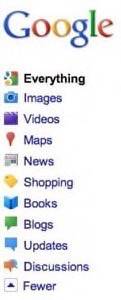Google is rolling out to all users today a number of substantial changes in the way it serves up search results. Search by content type (images, news, shopping, etc.) will now be highlighted in the left sidebar and users will be presented search options that are contextually relevant to the subject of their search.

Search for “shoes” and you’ll be offered links to search in maps, images and shopping. Search for “NFL Draft” and you’ll see options to search in blog posts and real-time updates highlighted. Search refinements like “less shopping,” features like the Google Wonder Wheel and search inside dynamically created timeframes will no longer be hidden out of sight but will be placed at the top of the user’s view by a dynamic relevance algorithm. Google says its internal testers have called the increase in their personal search efficiency “like night and day.” You’ll be able to judge for yourself sometime today.
Jon Wiley, Senior User Experience Designer for Google, told us by phone yesterday that the technology used to determine what kind of search is most relevant is the same that the company uses in Google Suggest and other existing search features, just applied now to a dynamic design of the user experience. The types of search questions users are presented with will change over time, based on aggregate query activity, types of content indexed and news events.

One brand new feature that’s included in the revisions today is the addition of a new related searches box in the sidebar. Whereas Google results have traditionally suggested more refined searches at the bottom of the page, you’ll now also be shown related but different searches. For example, a search for “Rolling Stones” has long resulted in suggestions like “Rolling Stones albums, Rolling Stones concerts” and those suggestions will now be supplemented with related searches like “Pink Floyd, Aerosmith” etc.
The changes all seem very smart, “why didn’t they think of that before” kinds of things. But for a battleship of a website, Google is remarkably adept at changing itself.
Google’s Wiley says a whole lot more change like this is coming, based on testing and user feedback. “Google is no longer just ten blue links on a page, those days are long gone,” he told us. “But this is just the beginning, a designer’s work is never done. It’s an evolution… It is definitely the early days of Google, this is not a solved problem.”





















